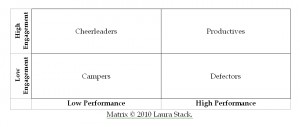“I consider it the highest compliment when my employees go out and start their own companies in competition with me. I always send them a plant to wish them well. Of course, it’s a cactus.” —Norm Brodsky, entrepreneur and author.
“The actively disengaged employees are the “cave dwellers.” They’re “Consistently Against Virtually Everything.” They’re not just unhappy at work; they’re busy acting out their unhappiness. Every day, actively disengaged workers undermine what their engaged coworkers accomplish.” — Curt Coffman, author of First Break All the Rules: What the World’s Greatest Managers Do Differently
If you’ve been reading my blog recently, you’re no doubt familiar with my Productivity Management Matrix , a method by which I categorize employees based on two factors: performance and engagement.
Admittedly, this is a simplification of a complex issue, but it does bring the issue down to brass tacks. I’ve identified four categories that I believe comprise nearly all the employees in any organization: Campers, Cheerleaders, Defectors, and Productives. Not all employees fit comfortably into the Matrix, but the vast majority do.
So far I’ve discussed how to recognize and deal with Campers and Cheerleaders. Now let’s take a look at the Dour Defectors.
Defectors are highly productive, but for one reason or another, they just can’t seem to engage with their work. Maybe they’re dealing with personal issues that inhibit engagement; they may dislike the company or their co-workers; they may resent authority; or they could simply be bored out of their skulls. Whatever the cause, if they get what they consider to be a better offer, they’ll jump ship in an instant.
How to Spot a Defector
The results-oriented performance that characterizes a Defector distinguishes them from their polar opposite, the Cheerleader, and their disengaged compatriot, the Camper—and it makes them much harder to identify than either, especially if they keep their heads down and just focus on their work.
To identify the quiet Defector, you have to look for little things like attitude and behavior. Do they seem satisfied? Do they act annoyed when you give them a task? Do they come off as aloof or distant? Do they miss work or skip meetings regularly?
None of these are smoking guns, but if you see a pattern, then you should become concerned. And of course, if you find out that they’re circulating their resumé among your competitors, that’s a dead giveaway!
How a Defector Can Impact Your Team
A Defector’s negativity can quickly erode the engagement and performance of other employees, especially if the Defector starts badmouthing the organization—as so many do. Even if they’re able to keep their tongues in check, it’s often pretty obvious to their teammates that given the chance, they’ll go AWOL. That attitude can become infectious. If there’s no obvious reason for the Defector’s lack of engagement, other employees might wonder what the Defector knows that they don’t…and this can cause them to worry, which may affect their performances.
Defectors can also be unreliable, because they just don’t care enough about their team to be there whenever they’re needed. It’s easy to miss a meeting or just not show up for work when you really don’t expect to be in your job much longer.
How to Handle a Defector
The goal with any Defector is get them to engage with their team and with the company in general, so that they can morph into one of those office wonders known as the Productive (of which more anon). If nothing else, you don’t want them to head for those alleged greener pastures, taking all that wonderful productivity with them. As annoying as they are, a Defector can be difficult and costly to replace.
So it’s in your best interests to do what you can to hang onto a Defector—assuming their cynicism isn’t much more than skin deep. If you find that they’re one of those unhappy people who can’t be satisfied anywhere, then you have to make a choice. If they’re quiet about their unhappiness and you really need their results, then you may want to keep things as they are. If they’re hurting the team environment and refuse to shape up, fire them.
How to Coach the Defector
Don’t try anything superficial, glib, or subtle with a Defector. Be frank and straightforward. Tell them you value their productivity, but realize they’re not happy. Make it clear that their disaffection is hurting both them and the team, and sound them out as to why they’re so difficult to work with.
The problem might be surprisingly easy to fix. Maybe they just don’t realize that they’re affecting other people with their disinterest, in which case all they need is a little attitude adjustment. Or it might sting their pride to learn that they’re considered a problem child, resulting in them shaping up just to prove that they can. If they’re dissatisfied about a particular issue, address that. Engaging them could be as simple as offering better opportunities for advancement, providing better equipment, or coaching them to a better understanding of the company’s goals.
In Conclusion…Defectors are expensive to replace, so you need to deal with them as soon as you realize you have a problem. A motivated Defector might not jump into the Productive category right away, but if they learn to value their job as much as they value their own performance, they’ll certainly start working in that direction. Give a Defector a little time and attention, and they may just end up becoming one of your best employees.



